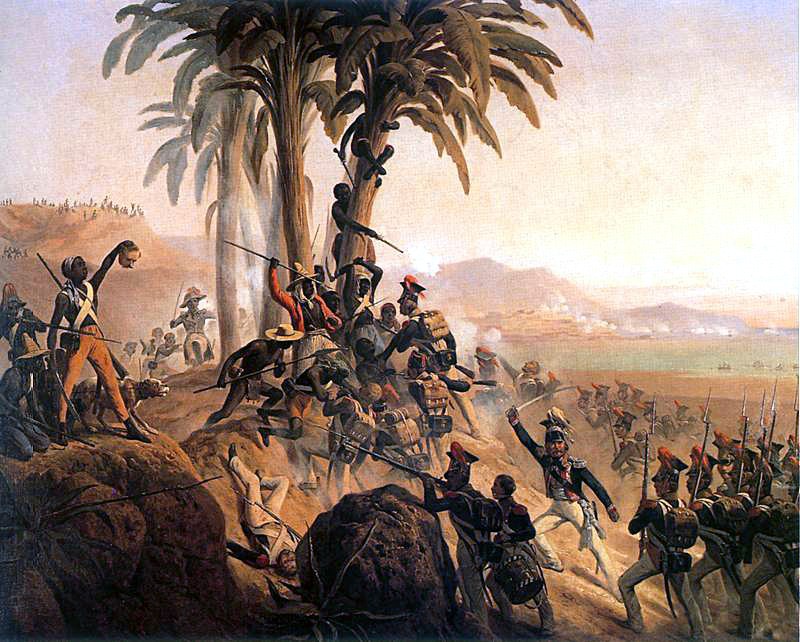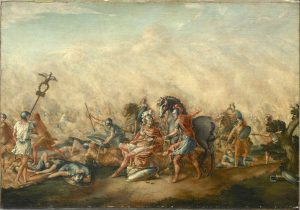The success of the American and the French Revolutions echoed through the people of the new and the old world. These events, powered by the Enlightenment ideas of popular sovereignty, individual freedom, and equality, proved that parting from powerful and oppressive rulers was possible.1 For the first time in recent history, the common man had united and fought for a republic based on the idea and practice of self-rule. This idea of fighting and revolting for independence traveled to slaves on the shores of a Caribbean island where the French had established the colony of Saint-Domingue in 1697.

Saint-Domingue was perhaps one of the most profitable lands that France had in its possession since it produced and exported coffee, indigo, tobacco, cotton, and sugar. The original aboriginal population of the islands had all but disappeared by the time the French had come to the island, and to make use of the colony, the French began to import slaves from Africa to work the fields. It is estimated that by 1789, the colony had a total of 500,000 African slaves, 35,000 white French settlers, and 50,000 colored freedmen who were French citizens and who also owned slaves.2 Despite slaves being the majority of the colony’s population, they lived under a strict and abusive social structure where they worked strenuous jobs under the threat of the whip, and would often starve to death. If runaway slaves were caught, they were often tortured and mutilated in order to dissuade other slaves that there was no escape from the chains of slavery. The daily life for the slaves of Saint-Domingue was one of fear and ill treatment.

French King Louis XIV established the “Code Noir” or Black Codes for the colony, which established rules for the treatment of slaves in all of its French American colonies. The code stated that slave owners were prohibited from sexually violating slaves or from torturing them, and they were required to provide food and clothes to the slaves. Nevertheless, slaves were regarded as property and could receive the death penalty if they did not comply with their masters.3
In 1788, fourteen slaves complained to the court that Nicolas Lejuene, a slave master’s son, would burn slaves alive, and although these acts were clearly violating the law, the courts and public opinion on the Island dismissed Lejuene and he was not prosecuted.4 This incident suggests that laws were not uniformly enforced in the colony, so masters had a free hand in their often atrocious treatments of their slaves. Many slaves ran away from their oppressive masters and hid in the mountains forming large communities of maroons. Their resentment to their French masters only escalated.5

With the ideas of political independence and social revolution circulating the world, slaves in the colony of Saint-Domingue were no longer willing to endure the treatment of their French masters. Tensions in the colony led to a violent uprising. The Haitian Revolution began in August 1791, when about 15,000 slaves destroyed and burned plantations and homes, and murdered white settlers in what was called the “Night of Fire.”6 This event encouraged the educated Catholic and former slave Toussaint L’Ouverture to join the cause. He helped train an army of 50,000 slaves in guerrilla warfare.7 The colony fell into chaos for years as the slaves revolted against French oppression in violent measures, and it was not long before the colony of Saint-Domingue was controlled by the slaves of the island.8

General L’Ouverture allied with the British in order to drive out the French settlers. But unwilling to let go of their colonial power, the French emancipated slaves in 1794; but they were still unable to secure and control the Haitian revolt. By 1803, L’Ouverture had proclaimed himself the governor of the colony, angering the powerful Napoleon Bonaparte who went after L’Ouverture, capturing and imprisoning him. This, however, did not weaken the resolve of the slaves to form an independent state. As Jean-Jacques Dessalines rose to power in the absence of Toussaint L’Ouverture, he ordered the gruesome execution of all Frenchmen in the colony. A year later, in 1804, Haiti was declared independent from French power.9
The slaves of Saint-Domingue were not expected to take on the example of the American colonies and the Enlightenment Era in order to fight for their independence. After the gory and terrible deaths of almost half the population in the colony–including French settlers, free black men and slaves–Haiti stood tall and free, shocking the world.10
- Jerry H. Bentley, Herbert F. Ziegler and Heather E. Streets-Salter, Traditions and Encounters: A Brief Global History Vol 2 (New York: MacGraw-Hill Education, 2016), 471. ↵
- Encyclopedia of Emancipation and Abolition in the Transatlantic World, 2007, s.v. “Haitian Revolution,” by Eugenio Matibag and Junius Rodriguez. ↵
- Philippe R. Girard, “Code Noir,” in Africa and the Americas: Culture, Politics, and History, no.1 (2008): 1. ↵
- Laurie M. Wood, “Across Oceans and Revolutions: Law and Slavery in French Saint-Domingue and Beyond,” Law & Social Inquiry 39, no. 3 (Summer 2014): 5. ↵
- Jerry H. Bentley, Herbert F. Ziegler and Heather E. Streets-Salter, Traditions and Encounters: A Brief Global History Vol 2 (New York: McGraw-Hill Education, 2016), 478-479. ↵
- The Black Past: Remembered and Reclaimed, 2007, s.v. “L’Ouverture Toussaint (1742-1803),” by Deborah McNally. ↵
- J. R. Beard, The Life of Toussaint L’Ouverture, the Negro Patriot of Hayti: Comprising an Account of the Struggle for Liberty in the Island, and a Sketch of Its History to the Present Period (Chapel Hill: University of North Carolina at Chapel Hill Library, 2012), 54. ↵
- Matt Clavin, “Race, Rebellion, and the Gothic: Inventing the Haitian Revolution,” Early American Studies, no. 1 (2007): 5. ↵
- Matt Clavin, “Race, Rebellion, and the Gothic: Inventing the Haitian Revolution.” Early American Studies, no. 1 (2007): 2. ↵
- Matt Clavin “Race, Rebellion, and the Gothic: Inventing the Haitian Revolution.” Early American Studies, no. 1 (2007): 5. ↵



70 comments
Sofia Almanzan
This article was interesting because I had never heard of the Haitian Slave Revolt before reading this article. The black code was saddening to find out about and reminded me of the three fourths compromise in the US. This article was informative and extremely sad.
Sara Guerrero
I’ve read and studied about Haiti before, but this article does a great job summarizing its history and independence, and the revolt in Haiti was something heard throughout the world which I think triggered a butterfly effect. Haiti, being a country that lives in poverty now, I think it was caused by their history of being colonized and taken advantage of their resources and not being offered the help needed to rebuild.
Arsema Abera
I have never heard about the Haitian revolution and the connection to slavery what so ever and so this was an interesting article to read. The black code was an interesting and sad thing to read about the making of laws, and all along I thought the French were being rational and turns out they were not at all and as a matter of fact ignoring the right of slaves.
Aaron Sandoval
This article was well written and gives attention to a relatively unknown part of history. I was aware of slavery and its impact in the region, but I never knew about the revolt that led to the development of Haiti. This impactful event is in a sense bittersweet, we have people who have been oppressed their entire lives, finally revolting and winning, and taking their freedom with force, I say it is bittersweet because it those oppressed should never have been oppressed and forced to fight for their freedom.
Antonio Holverstott
The slaves on Haiti were treated with significant contempt by their masters even with laws set in place by the French crown to stop such practices from occurring. During the French revolution, France did not secure and give more rights to enslaved persons. All of these circumstances were fuel for the fire of an extremely violent and racially driven revolution.
Zachary Kobs
I love to read stories about the oppressed rising up against their oppressors and fighting for what is right. It is unfortunate how the situation transpired in the first place but I am glad that the slaves stood up to their former masters. The execution of all the French men in the colony did seem a little harsh at the end but I am sure the decision was made with good justification.
Samuel Vega
Informative article on the establishment of Haiti. Still hard to comprehend the violence that is associated with the various revolutions and wars during the Age of Revolution. The oppressed must take a stand. Death is likely under the oppression and when the revolution occurs. It is necessary for the survival of the people. Although today we don’t see the mass violence on a large scale there is lots of oppression.. Are we doing enough to help the oppressed.
Glory Turnbull
The brutality of sugar plantations stike again! When we think of revolution, we often imagine people fighting for a better life, but when it comes to slave rebellions, there is so much more at stake than taxation and popular sovereignty. This is why I find slave revolts to be some of the most heart-wrenching episodes in history– people risking so much and often getting so little. I’m glad that Haiti is a success, though like all nations, they continue to face modern problems in today’s world.
Jose Chaman
This article is very informative. Although I had already studied the slave revolution in Sant-Domingue, I had not deepened as much as with this article. It seems incredible to me that of all the revolutions of that time, only that of Sant-Domingue was victorious. Slavery will always be an incredibly terrible fact, which is why L’Overture can be considered as one of the precursors of the revolution for human rights and against slavery
Michael Leary
Very interesting article about the Haitian Slave Revolt, I had not heard too much about this before reading the article. Slavery on the West Indies was definitely a terrible thing and was in some ways worse than slavery was on the Continental United States. It was interesting that the slaves went and fought for freedom and were able to liberate themselves.